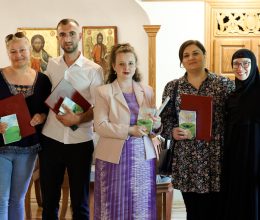
Abortion is one of the most pressing and controversial issues of our time, with legal, social, and healthcare institutions all vying for the right to make decisions or resolutions on this matter. According to the current Law on Termination of Pregnancy in the Republic of Macedonia, the doctor was “obliged to counsel the pregnant woman on the potential benefits of continuing the pregnancy, as well as the risks of performing or not performing the abortion in relation to the woman’s health and life, the methods of abortion, and to inform her of the possibilities and methods of preventing pregnancy.” However, in recent times, in this society of guaranteed rights, freedom of choice, and democracy, as we can read and hear from public media, there are calls for “easing” the process of infanticide—that is, the removal of the mandatory ultrasound that allows the heartbeat of the baby in the womb to be heard, the elimination of the mandatory 72-hour waiting period after the abortion request, whose purpose was to give the woman additional time for deeper reflection and consultation with her loved ones.
All of this only complicates matters, given the haste with which the decision to terminate a pregnancy is often made, the irresponsibility with which the act is carried out, and the recklessness with which this act is justified from both ethical and legal perspectives by various actors in society and politics. Of course, the Church holds certain positions, based on general moral principles, in support of a more dignified life, but it does not impose these as strict rules nor does it seek to limit the mother’s free will to do what she wishes with her own body or her freedom to decide whether or not to keep the child. On the other hand, this does not absolve the societal factors of their responsibility (primarily moral) to inform the mother that she is not the only one with rights—the father also has an equal right, as he has equally contributed to the conception of the child. And since we are speaking of rights, where are the rights of the unborn child in this equation?
Despite all modern tendencies to deny the view that a fetus is a person, we must still ask a few fundamental questions:
-
When does the embryo become human?
-
Is a newborn a person?
-
What is the value of a human life, and who is responsible for it?
If anyone reflects even slightly on these questions, they will inevitably conclude that a human being does not become a person at some specific moment in their development, but is a human being at every stage of life, from the moment of conception. Of course, the embryo is not a fully formed person. But the same can be said of a newborn or a small child. Nevertheless, from the very moment of birth, society guarantees that newborn certain fundamental and inviolable rights, and any violation of those rights is punishable by law. Yet that newborn did not come into being the moment it was born from its mother’s womb, but began its life nine months earlier, in the womb. And from the very first moment, the mother is aware of that life within her and feels it strongly.
Now, we must ask: If we acknowledge that the embryo is a stage in the life of a human being, a life that, as we said, society ought to guarantee, who protects the rights of the embryo? Besides belonging to both the father and the mother, the embryo is also a separate living being. This being suffers a grave injustice when it is killed by its parents, or more specifically, by the mother who carries it. Neither ethically, legally, nor medically can the act of taking the life of a human being already in development be recognized as a human right. In fact, the helplessness of the embryo to defend itself should not legitimize its destruction, but rather calls for societal laws to ensure its protection.

All of this, in fact, only increases the responsibility carried by the relevant social institutions, which, in guaranteeing the mother’s rights, must not allow themselves, in the name of freedom and democracy, to encourage or support her decision to terminate her pregnancy. Instead, they should ensure that, from every perspective, the serious implications of such an act are thoroughly explained to her. After all, doesn’t democracy guarantee the rights of everyone?
That is why we believe it is irresponsible and lacking in accountability to extend the legal limit for abortion up to the 22nd week and to remove any legal requirement for the mother to be advised to reflect and seek counsel before making her decision. Even in cases where abortion is “necessary” for health reasons, due to fetal impairment or risks to the mother’s health, consultation is required for each case, through joint cooperation between the mother and the healthcare, social, and legal services before a final decision is made—a decision for which all parties must bear responsibility.
The Church has always cared for humanity, seeking to guide people toward the fullness of their existence by inscribing moral principles in their hearts and encouraging them to rise morally and spiritually above the pagan primitivism that, sadly, reigns in the world today. The Church seeks to encourage, not to compel. This means that the Church’s true mission is not to pressure people or the state into changing laws if its citizens do not desire it and wish to live according to those pagan principles. The Church loves every person, respects their free will, but at the same time, because of that love, does not wish to see them fall into the bondage of passions and despair, living recklessly and sinfully. The Church seeks to protect them from the harsh consequences that arise from the abuse of free will. For it is one thing to be truly free, and quite another to become a slave to passions through the gift of freedom.
What is happening today in our country is a serious indicator that our people are in need of such moral elevation. It is high time to overcome the fear and prejudice that if the Church is involved in resolving or discussing certain social processes, problems, and movements, it will threaten the secular principle of the state’s organization. No, the Church would simply use the opportunity to be more present among the people, offering its moral compass, which helps avoid the wrong path that leads to the abyss.

In this context, the claim that “God is the greatest enemy of women” is utterly false, for history clearly shows what the status of women was and how they were treated before Christianity. No one can deny this. It was Christ who restored the lost freedom of women, embracing them with respect as their true and faithful friend, granting them dignity and equality—things they did not have before, and for which they are now fighting so unnecessarily in the 21st century.















